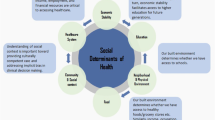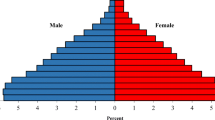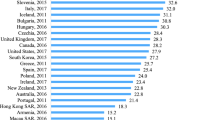Abstract
Purpose
Household poverty associated with schizophrenia has been long described. However, the mechanisms by which schizophrenia may have influenced the economic status of a household in rural communities are still unclear. This study aimed to test an integrated model of schizophrenia, social support and caregiving burden on household poverty in a rural community in China.
Methods
A mental health survey using identical methods and ICD-10 was conducted in six townships of Xinjin County (population ≥ 15 years old, n = 152,776), Chengdu, China in 2015. Identified persons with schizophrenia (n = 661) and their caregivers completed a joint questionnaire of sociodemographic information, illness conditions, social support and caregiving burden. Descriptive analysis was applied first to give an overview of the dataset. Then, multivariable regression analyses were conducted to examine the associative factors of social support, caregiving burden and household income. Then, structural equation modeling (SEM) was used to estimate the integrated model of schizophrenia, social support, caregiving burden and household income.
Results
Households with patient being female, married, able to work and having better social function were better off. Larger household size, higher social support and lower caregiving burden also had salient association with higher household income. The relationship between schizophrenia and household poverty appeared to be mediated by the impacts of schizophrenia on social support and caregiving burden.
Conclusion
There was a strong association between schizophrenia and household poverty, in which social support and caregiving burden may had played significant roles on mediating it. More precise poverty alleviation policies and interventions should focus on supporting recovery for persons with schizophrenia, as well as on increasing social support and on reducing family caregiving burden.


Similar content being viewed by others
References
Ran MS, Weng X, Liu Y et al (2019) Change of treatment status of persons with severe mental illness in a rural China, 1994–2015. Br J Psychiatry Open 5(e31):1–7
Zipursky RB, Menezes NM, Streiner DL (2014) Risk of symptom recurrence with medication discontinuation in first-episode psychosis: a systematic review. Schizophr Res 152(2–3):408–414
Lund C, De Silva M, Plagerson S, Cooper S, Chisholm D, Das J, Knapp M, Patel V (2011) Poverty and mental disorders: breaking the cycle in low-income and middle-income countries. Lancet 378(9801):1502–1514
Liu Z, Huang Y, Lv P, Zhang T, Wang H, Li Q, Yan J, Yu Y, Kou C, Xu X (2016) The China Mental Health Survey: II. Design and field procedures. Soc Psychiatry Psychiatr Epidemiol 51(11):1547–1557
Huang Y, Wang Y, Wang H, Liu Z, Yu X, Yan J, Yu Y, Kou C, Xu X, Lu J (2019) Prevalence of mental disorders in China: a cross-sectional epidemiological study. Lancet Psychiatry 6(3):211–224
Jablensky A (2000) Epidemiology of schizophrenia: the global burden of disease and disability. Eur Arch Psychiatry Clin Neurosci 250(6):274–285
Sagli G, Zhang J, Ingstad B, Fjeld HE (2013) Poverty and disabled households in the People’s Republic of China: experiences with a new rural health insurance scheme. Disabil Soc 28(2):218–231
Ran MS, Yang LH, Liu YJ, Huang D, Mao WJ, Lin FR, Li J, Chan CLW (2017) The family economic status and outcome of people with schizophrenia in Xinjin, Chengdu, China: 14-year follow-up study. Int J Soc Psychiatry 63(3):203–211
Lim K-L, Jacobs P, Ohinmaa A, Schopflocher D, Dewa CS (2008) A new population-based measure of the economic burden of mental illness in Canada. Chronic Dis Can 28(3):92–98
Zhang TM, Wong IYL, Yu YH, Ni SG, He XS, Bacon-Shone J, Gong K, Huang CH, Hu Y, Tang MM, Cao W, Chan CLW, Ran MS (2018) An integrative model of internalized stigma and recovery-related outcomes among people diagnosed with schizophrenia in rural China. Soc Psychiatry Psychiatr Epidemiol 54:911–918
Lv Y, Wolf A, Wang X (2013) Experienced stigma and self-stigma in Chinese patients with schizophrenia. Gen Hosp Psychiatry 35(1):83–88
Sharac J, Mccrone P, Clement S, Thornicroft G (2010) The economic impact of mental health stigma and discrimination: a systematic review. Epidemiol Psychiatr Sci 19(3):223–232
Metts R (2004) Disability and development. In: Background paper prepared for the disability and development research agenda meeting, 2004
Sav A, King MA, Whitty JA, Kendall E, McMillan SS, Kelly F, Hunter B, Wheeler AJ (2015) Burden of treatment for chronic illness: a concept analysis and review of the literature. Health Expect 18(3):312–324
Hailemichael Y, Hailemariam D, Tirfessa K, Docrat S, Alem A, Medhin G, Lund C, Chisholm D, Fekadu A, Hanlon C (2019) Catastrophic out-of-pocket payments for households of people with severe mental disorder: a comparative study in rural Ethiopia. Int J Ment Health Syst 13:39. https://doi.org/10.1186/s13033-019-0294-7
Rodakowski J, Skidmore ER, Rogers JC, Schulz R (2012) Role of social support in predicting caregiver burden. Arch Phys Med Rehabil 93(12):2229–2236
Raikes HA, Thompson RA (2005) Efficacy and social support as predictors of parenting stress among families in poverty. Infant Ment Health J 26(3):177–190
Xu A, Xia Y (2014) The changes in mainland Chinese families during the social transition: a critical analysis. J Comp Fam Stud 45(1):31–53
Patel V, Xiao S, Chen H, Hanna F, Jotheeswaran A, Luo D, Parikh R, Sharma E, Usmani S, Yu Y (2016) The magnitude of and health system responses to the mental health treatment gap in adults in India and China. Lancet 388(10063):3074–3084
Ran MS, Chan CLW, Chen EYH, Mao WJ, Hu SH, Tang CP, Lin FR, Conwell Y (2009) Differences in mortality and suicidal behaviour between treated and never-treated people with schizophrenia in rural China. Br J Psychiatry 195(2):126–131
Ran MS, Weng X, Chan CLW, Chen EYH, Tang CP, Lin FR, Mao WJ, Hu SH, Huang YQ, Xiang MZ (2015) Different outcomes of never-treated and treated patients with schizophrenia: 14-year follow-up study in rural China. Br J Psychiatry 207(6):495–500
Ran MS, Yu YH, Peng MM, Liu YJ, Zhang TM, Hu SH, Zhou D, Yang HJ, Yang X, Luo W (2018) Poverty and outcomes of people with severe mental disorders in rural China: a 21-year survey. Lancet 392:S7
Startup M, Jackson MC, Bendix S (2002) The concurrent validity of the Global Assessment of Functioning (GAF). Br J Clin Psychol 41(4):417–422
Vatnaland T, Vatnaland J, Friis S, Opjordsmoen S (2007) Are GAF scores reliable in routine clinical use? Acta Psychiatr Scand 115(4):326–330
Söderberg P, Tungström S, Armelius BÅ (2005) Special section on the GAF: reliability of Global Assessment of Functioning ratings made by clinical psychiatric staff. Psychiatr Serv 56(4):434–438
Jia C, Zhang J (2012) Psychometric characteristics of the Duke social Support Index in a young rural Chinese population. Death Stud 36(9):858–869
Graessel E, Berth H, Lichte T, Grau H (2014) Subjective caregiver burden: validity of the 10-item short version of the Burden Scale for Family Caregivers BSFC-s. BMC Geriatr 14(1):23
Kaplan D (2008) Structural equation modelling: foundations and extensions. Sage Publications, Thousand Oaks10
Read J (2010) Can poverty drive you mad? 'Schizophrenia', socio-economic status and the case for primary prevention. N Z J Psychol 39(2):7
Alesina A, Giuliano P, Nunn N (2013) On the origins of gender roles: women and the plough. Q J Econ 128(2):469–530
Fei HT (2013) Peasant life in China. Read Books Ltd, London
Li XY (2016) Marriage poverty: a nightmare for adult males in remote mountainous areas of China. J Yunnan Natl Univ (Soc Sci Ed) 1:136–144
Mitra S, Posarac A, Vick B (2013) Disability and poverty in developing countries: a multidimensional study. World Dev 41:1–18
Groce N, Kett M, Lang R, Trani JF (2011) Disability and poverty: the need for a more nuanced understanding of implications for development policy and practice. Third World Q 32(8):1493–1513
Rani U, Schmid JP (2007) Household characteristics, employment and poverty in India. In: 2nd IZA/World Bank conference on employment and development, 2007. Citeseer
Wang S, Li W (2003) Changes and their causes of household income in poor counties. Issues Agric Econ 24(3; ISSU 279):19–24
Sikander M, Ahmed M (2008) Household determinants of poverty in Punjab: a logistic regression analysis of MICS (2003–2004) data set. In: 8th Global conference on business and economics. Florence, Italy, 2008
Kleinman A, Kleinman J (1993) Face, favor and families: the social course of mental health problems in Chinese and American societies. Chin J Ment Health 6:37–47
Yang LH, Kleinman A (2008) ‘Face’ and the embodiment of stigma in China: the cases of schizophrenia and AIDS. Soc Sci Med 67(3):398–408
Zhang S, Edwards H, Yates P, Li C, Guo Q (2014) Self-efficacy partially mediates between social support and health-related quality of life in family caregivers for dementia patients in Shanghai. Dement Geriatr Cogn Disord 37(1–2):34–44. https://doi.org/10.1159/000351865
Hsiao CY, Van Riper M (2010) Research on caregiving in Chinese families living with mental illness: a critical review. J Fam Nurs 16(1):68–100
Chiou CJ, Chang HY, Chen IP, Wang HH (2009) Social support and caregiving circumstances as predictors of caregiver burden in Taiwan. Arch Gerontol Geriatr 48(3):419–424
Tse S, Ran MS, Huang Y, Zhu S (2013) Mental Health Care Reforms in Asia: the urgency of now: building a recovery-oriented, community mental health service in China. Psychiatr Serv 64(7):613–616
Hert De M, Cohen D, Bobes J, Cetkovich-Bakmas M, Leucht S, Ndetei DM, Newcomer JW, Uwakwe R, Asai I, Möller HJ (2011) Physical illness in patients with severe mental disorders. II. Barriers to care, monitoring and treatment guidelines, plus recommendations at the system and individual level. World Psychiatry 10(2):138–151
Woolcock M (1998) Social capital and economic development: toward a theoretical synthesis and policy framework. Theory Soc 27(2):151–208
Wang LJ, Feng Y, Jin L (2019) The role of social support on poverty alleviation: evidence from Shaanxi province. J Agrotech Econ 2:18–24
Lefley HP (1996) Family caregiving in mental illness. Sage Publications, Inc, Thousand Oaks
Gardiner K, Millar J (2006) How low-paid employees avoid poverty: an analysis by family type and household structure. J Soc Policy 35(3):351–369
Giesbert L, Schindler K (2012) Assets, shocks, and poverty traps in rural Mozambique. World Dev 40(8):1594–1609
Acknowledgements
The authors thank all the collaborative institutes (e.g., Xinjin Second People’s Hospital, Chengdu Mental Health Center, Sichuan Veterans Hospital, Jingzhou Mental Health Center, Guangyuan Mental Health Center, Santai Mental Health Center, Sichuan College of Traditional Chinese Medicine, Southwest Medical University, Chongqing Medical University, Chengdu Mental Hospital, Panzhihua Mental Health Center) and Chengdu Mental Health Project (CMHP) study group for collaboration, support and data collection.
Funding
The mental health survey in 2015 was supported in part by Seed Funding Programme for Basic Research (HKU, 2014–2016), Seed Funding Programme for Applied Research (HKU, 2014–2016), Strategic Research Theme (SRT): Contemporary China Seed Funding (HKU, 2014–2016), and Mental Health Research in Chengdu, China (Dept. Matching Fund, 2015–2017).
Author information
Authors and Affiliations
Corresponding author
Ethics declarations
Conflict of interest
There is no conflict of interest.
Ethical standards
This survey was approved by the University Human Research Ethics Committee (HREC). All research participants received informed consent of this study, including a detailed explanation for it.
Additional information
Publisher's Note
Sringer Nature remains neutral with regard to jurisdictional claims in published maps and institutional affiliations.
Rights and permissions
About this article
Cite this article
Yu, YH., Peng, MM., Bai, X. et al. Schizophrenia, social support, caregiving burden and household poverty in rural China. Soc Psychiatry Psychiatr Epidemiol 55, 1571–1580 (2020). https://doi.org/10.1007/s00127-020-01864-2
Received:
Accepted:
Published:
Issue Date:
DOI: https://doi.org/10.1007/s00127-020-01864-2




